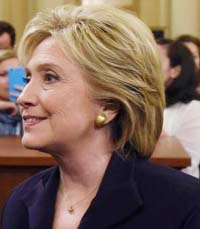
AFP, Washington :
Hillary Clinton had one mission during her daylong testimony in front of a House select committee investigating the 2012 attacks in Benghazi, Libya: Don’t get angry.
Clinton’s last appearance before the committee – in January 2013 – was defined by a single moment in which Clinton lost her temper with Wisconsin Sen. Ron Johnson (R) when he probed about the genesis of the attacks.
“What difference, at this point, does it make?” Clinton shouted at Johnson, waving her arms demonstrably.
Republicans immediately seized on that made-for-cable-TV moment as a sign of Clinton’s frustration at being asked to explain the deaths of American diplomats. Soon, it was all over the Internet.
Clinton clearly had that outburst on her mind as she prepared for the marathon day of questioning about what she knew, when she knew it and how she reacted in the run-up and wake of the attacks in Benghazi. Her opening statement was a somber remembrance of the four men who died that fall day in 2012; she cast her appearance before the committee as her way of honoring their service. Time after time, she refused to be goaded to anger by pointed questions by Republican members of the committee, deflecting the queries with either humor or unfamiliarity. (I don’t know those people, I didn’t see that document etc.)
Hillary Clinton had one mission during her daylong testimony in front of a House select committee investigating the 2012 attacks in Benghazi, Libya: Don’t get angry.
Clinton’s last appearance before the committee – in January 2013 – was defined by a single moment in which Clinton lost her temper with Wisconsin Sen. Ron Johnson (R) when he probed about the genesis of the attacks.
“What difference, at this point, does it make?” Clinton shouted at Johnson, waving her arms demonstrably.
Republicans immediately seized on that made-for-cable-TV moment as a sign of Clinton’s frustration at being asked to explain the deaths of American diplomats. Soon, it was all over the Internet.
Clinton clearly had that outburst on her mind as she prepared for the marathon day of questioning about what she knew, when she knew it and how she reacted in the run-up and wake of the attacks in Benghazi. Her opening statement was a somber remembrance of the four men who died that fall day in 2012; she cast her appearance before the committee as her way of honoring their service. Time after time, she refused to be goaded to anger by pointed questions by Republican members of the committee, deflecting the queries with either humor or unfamiliarity. (I don’t know those people, I didn’t see that document etc.)

